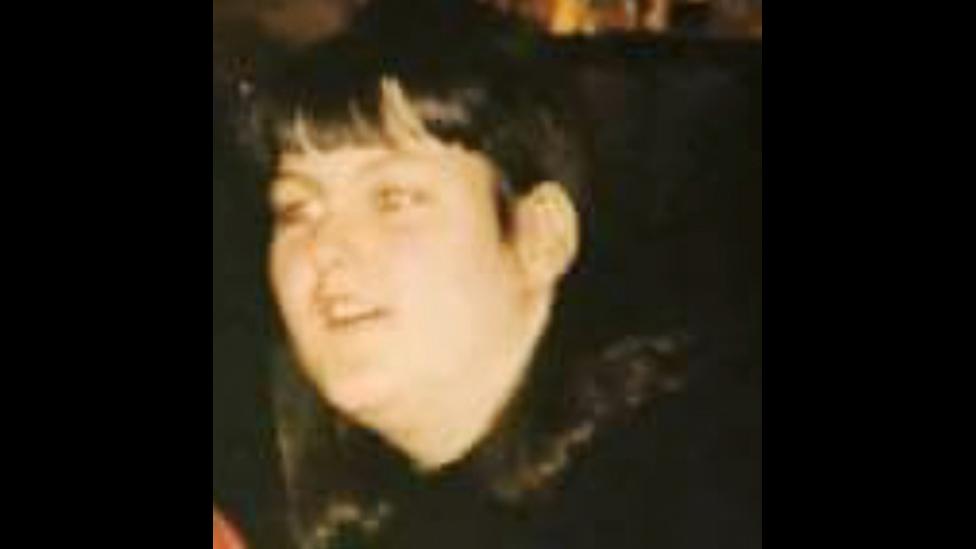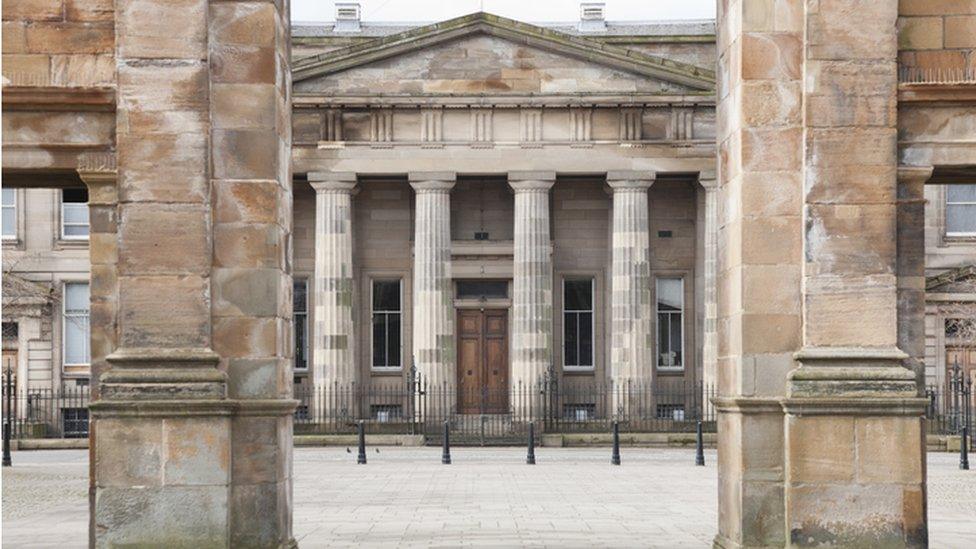Margaret Fleming trial: No trace of DNA found on belongings
- Published

Margaret Fleming was reported missing in October 2016
A murder trial has heard that clothing said to belong to a missing woman contained no trace of her DNA.
Forensic scientist James Hawkins was giving evidence at the High Court in Glasgow where Edward Cairney, 77, and Avril Jones, 59, are on trial.
The pair had claimed that a jumper, t-shirt, socks and a toy had belonged to Margaret Fleming before her disappearance.
Both deny murdering her sometime between December 1999 and January 2000.
Mr Cairney and Ms Jones were looking after Margaret Fleming, who has allegedly not been seen for more than 19 years, at the time of her disappearance.
Mr Hawkins told prosecutor Iain McSporran QC that he was handed a tartan jumper, six black socks, a penguin toy and a blue t-shirt by police.
He told the court: "The items were handed over by Edward Cairney and Avril Jones as belongings of or worn by Margaret Fleming."
No DNA detected
The jury heard that Mr Cairney's DNA was found on the socks and both he and Ms Jones' DNA was also found on the jumper.
However, no DNA attributed to either of them or Margaret Fleming was found on the toy.
The prosecutor asked Mr Hawkins: "Did you find any DNA on these items that could be that of Margaret?"
The witness replied: "No DNA which could be attributed to Margaret Fleming could be detected."
The scientist was asked what his conclusion was.
Mr Hawkins said: "In my opinion these findings are not what we would have expected if Margaret Fleming had worn these items or handled the penguin toy regularly."
Defence QC Thomas Ross, representing Mr Cairney, said: "You found DNA which was not suitable for analysis. Could that have been from Margaret?"
Mr Hawkins replied: "Yes."

The case is being heard at the High Court in Glasgow
The court also heard that none of Ms Fleming's blood was found at the couple's home on Main Road, Inverkip, Inverclyde.
The interior was tested with luminol - which shows up blood not visible to the naked eye - and nothing was discovered.
'Shy and timid'
The trial then heard from a former friend who visited Mr Cairney and Ms Jones at their home, Seacroft. She said she saw Margaret Fleming four times at Seacroft between 1997 and late 1999.
She told the High Court in Glasgow that she and her husband left in December 1999 for a three month holiday in America and never saw her again.
Cheryl Harrison, 55, from Irvine, told prosecutor Iain McSporran QC: "I thought Margaret was shy and timid."
Mr McSporran said: "Was anything said by Mr Cairney or Miss Jones about why Margaret was there and who she was," and Ms Harrison replied: "I don't know. I didn't want to interfere. It wasn't any of my business.
The witness was asked if she had asked where Ms Fleming had gone and said: "Yes, both of them told us she had gone away with travelling people."
Concerns raised
Police began investigating Margaret Fleming's disappearance in 2016 after a benefits claim submitted by Ms Jones on Ms Fleming's behalf raised concerns about her well-being.
Margaret Fleming, who would now be 38, went to live with Edward Cairney and Avril Jones after her father died in October 1995 and her mother struggled to cope.
Earlier in evidence, Ms Fleming's GP Dr James Farrell said he last saw her in October 1999 accompanied by Mr Cairney and referred her to a psychologist at the Renfrewshire and Inverclyde Community Learning Disability team as he felt she was 'socially and educationally" isolated.
Dr Farrell told the jury that Dr Alan Smith from the team visited Ms Fleming in Inverkip before Christmas 1999, but all attempts to contact her and arrange another appointment came to nothing.
The GP described her as having "quite significant learning difficulties" and said that she may have had Soto's syndrome from birth - although a definitive diagnosis was never made.
Mr Cairney and Ms Jones are accused of defrauding £182,000 in benefits and attempting to defeat the ends of justice by claiming Ms Fleming was alive.
They deny all the charges against them.
The trial before judge Lord Matthews continues.
- Published14 May 2019

- Published13 May 2019

- Published10 May 2019

- Published9 May 2019
